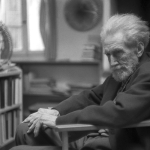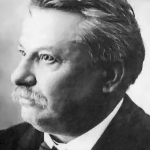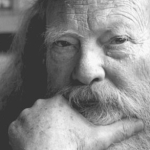The sun is high, the seaside air is sharp,
And salty light reveals the Mayan school.
The Irish hope their names are on the harp,
We see the sheep's advertisement for wool,
Boulders are here, to throw against a tarp,
From which comes bursting forth a puzzled mule.
Perceval seizes it and mounts it, then
The blood-dimmed tide recedes and then comes in again.
Fateful connections that we make to things
Whose functioning's oblivious to our lives!
How sidewise news of light from darkness springs,
How blue bees buzz from big blooms back to hives
And make the honey while the queen bee sings
Leadbelly in arrangements by Burl Ives—
How long ago I saw the misted pine trees
And hoped, no matter how, to get them into poetry!
Stendhal, at fifty, gazing as it happened
On Rome from the Janiculum, decided
That one way he could give his life a stipend
Was to suspend his being Amour's fighter
And get to know himself. Here he had ripened
Accomplished, loved, and lived, was a great writer
But never had explored in true detail
His childhood and his growing up. So he set sail
Composing La Vie de Henry Brulard
But in five hundred pages scarcely got
Beyond his seventeenth year, for it is hard
To take into account what happens here
And fit it all onto an index card.
Even one moment of it is too hot,
Complex and cannibalistically connected
To every other, which is what might be expected.
Sterne's hero has a greater problem, never
Getting much past his birth. I've had a third one.
My autobiography, if I should ever
Start out to write it, quickly seems a burden
An I-will-do-that-the-next-time endeavor.
Whatever life I do write's an absurd one
As if some crazy person with a knife
Cut up and made a jigsaw puzzle of a life.
In any case a life that's hardly possible
In the conditions that we really live in,
Where easy flying leaps to inaccessible
Mountainy places where love is a given
And misery, if there, infinitesimal,
Are quite the norm. Here none by pain is driven
That is not curable by the romanza
That's kept in readiness to finish any stanza.
Whatever, then, I see at this late stage of
My life I may or may not have stayed ignorant
Of that great book I've strained to write one page of
Yet always hoping my page was significant.
Be it or not, for me and for the ages
I leave it as it is. Yet as a figurant
Who has not stopped, I'm writing in addition
More lines to clarify my present disposition.
One person in a million finds out something
Perhaps each fifty years and that is knowledge.
Newton, Copernicus, Einstein are cunning.
The rest of us just rise and go to college
With no more hope to come home with the bunting
Than a stray dachshund going through the village.
However, what a treat our small successes
Of present and of past, at various addresses!
To be in all those places where I tarried
Too little or too late or bright and early
To love again the first woman I married
To marvel at such things as melancholy,
Sophistication, drums, a baby carriage,
A John Cage concert heard at Alice Tully—
How my desire when young to be a poet
Made me attentive and oblivious every moment!
Do you remember Oceanview the Fair?
The heights above the river? The canoes?
The place we beached them and the grass was bare?
Those days the sandbars gave our knees a truce?
The crooked line of pantry shelves, with pear
And cherry jam? And Pancho, with his noose?
Do you remember Full and Half and Empty?
Do you remember sorrow standing in the entry?
Do you remember thought, and talking plainly?
Michel and I went walking after Chartres
Cathedral had engaged our spirits mainly
By giving us an insight into Barthes.
Michel said he was capable of feigning
Renewed intentions of the soul's deep part,
Like this cathedral's artificial forces
That press a kind of artless thought into our faces.
The porcupine turns over on its belly
And new conceptions rap at the cocoon.
Civilization, dealing with us fairly,
For once, releases its Erectheion
Of understanding, which consoles us, nearly.
Later we study certain characteristics
That may give us a better chance with the statistics.
How much I'd like to live the whole thing over,
But making some corrections as I go!
Be with my babies on a sled in snow.
By twenty I'd have understood my mother
And by compassion found a way to know
What separates the what-I-started-out-as
From what-I-sometimes-wished-I-was-when-in-the-mountains.
To be once more the one who what was worthy
Of courtship courted—it was quite as stressful
As trying to, er, as they say, give birth to
A poem and as often unsuccessful,
But it was nice to be sublime and flirty
With radiant girls, and, in some strange way, restful.
I could be everything I wasn't usually—
And then to get somebody else to feel it mutually!
In poems the same problem or a similar.
Desire of course not only to do old things
But things unheard of yet by nuns or visitors
And of the melancholy finch be co-finch
In singing songs with such a broad parameter
That seamstresses would stare, forget to sew things,
Astronauts quit the sky, athletes the stadium
To hear them, and the rest of what they hear be tedium.
Such wild desires, I think it's recognizable
Are part and parcel of the Human Image
And in a way, I'd say, no less predictable
Than Popeye's feelings for a can of spinach.
Yet if we're set on course by the Invisible,
All pre-determined, what about the language
That teases me each morning with its leanings
Toward the Unprogrammed Altitudes beyond its meanings?
Are you, O particles, O atoms, nominatives
Like Percevals and Stendhals, set in motion
By some Ordaining Will that is definitive?
Is this invading chill and high emotion,
This tendency to know one is regenerative,
Is this, all, tidal take-home like the ocean?
Be what you may, my thanks for your society
Through the long life I've had, your jokes and your variety,
The warmth you've shown in giving me a temperature
That I can live with, and the strength you've shared with me
In arms and legs—and for your part in literature,
What can I say? It is as if life stared at me
And kissed my lips and left it as a signature.
Thank you for that, and thank you for preparing me
For love itself, and friendship, its co-agent.
Thank you for being this, and for its inspiration.









Comment form: